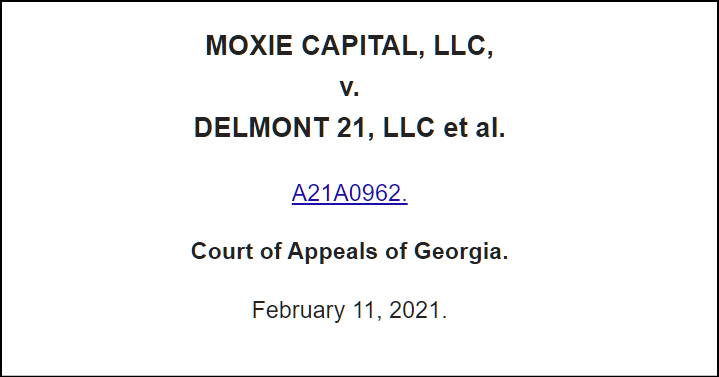
Redemption Process
A new Georgia appellate case, Moxie Capital v. Delmont 21 (2021), has been released that every tax deed purchaser, investor, and property owner should know about. The case involves how to redeem a property following a tax sale.
OCGA § 48-4-40 says the property owner or an interest holder in the property may redeem a property following a tax sale. Redemption must occur within a twelve-month window and after a notice of right to redeem has been provided. OCGA § 48-4-42 states how much a redeeming party must pay to redeem. Importantly, the funds required to redeem “shall be paid in lawful money of the United States.”
Redemption Dispute
In Moxie Capital, an investor attempted to redeem a property. For various reasons, the attempted redemption occurred on the last day of the redemption period. The investor contacted the tax deed holder for a payoff. There were conflicting versions of what happened from there. The investor said the tax deed holder did not cooperate; while the tax deed holder argued he had no obligation to cooperate.
What the parties don’t dispute is that the investor timely delivered a personal check to the tax deed holder. The investor claimed that certified funds were not available because the banks had closed by the time he found out the details of where to deliver the redemption amount. On the next day, the tax deed holder returned the personal check to the investor. And claimed that the investor’s right to redeem had expired.
Naturally, this went to court. While somewhat complicated, ultimately, the investor lost. And the tax deed purchaser got the property. The Georgia Court of Appeals ruled that to redeem, funds must be in the form of cash or certified check. The Court cited OCGA § 48-4-42, which says funds must be “paid in lawful money of the United States.” Although no Georgia court has clearly defined “lawful money,” the Georgia Court of Appeals reasoned that a personal check is a promise to pay. Thus, the Court of Appeals did not consider the investor’s personal check to be a payment.
The Court of Appeals also suggested that a tax deed purchaser has no obligation to act in “good faith” when responding to a party trying to redeem.
Don’t Wait Until the Last Minute – Call Us
Moxie Capital is consistent with other Georgia cases that apply redemption statutes strictly. Some would say harshly. Whether you agree or disagree with the outcome will depend on which side of the ledger you’re on.
Regardless of if you are a tax deed purchaser or a homeowner, we will be glad to represent you to get you through the process safely.
Call Us at 404-382-9991 to speak with an attorney regarding your options!

